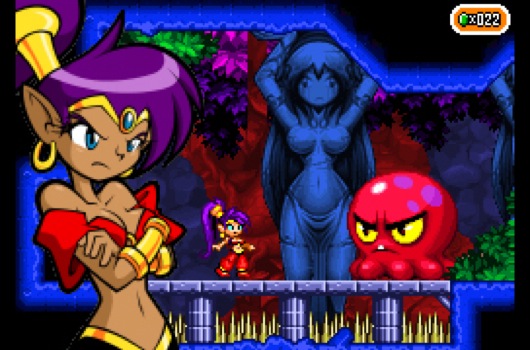I’ve been playing Shantae: Risky’s Revenge. The product (and original license) of one Wayforward Studios, the Shantae series arose as a strange title by Capcom late in the system life of the Game Boy Color. Nobody bought the game, unfortunately, and it spiked in price. However, for whatever reason, the Shantae series underwent a renaissance in the early 2010s, and she’s literally appearing on every Nintendo platform in some form or another.
The particular game I’m playing, they say, is the second game in the series. I describe it best as “Metroidvania”, and there’s not much more to say beyond that. Shantae’s default attack (hair-whipping) may as well be a sword with a fixed range, she jumps, she transforms to traverse areas via bellydancing (like Symphony of the Night, minus the dancing), and you explore areas to find new places to go. The structure does give a Zelda-esque quality to it, with specific sections set aside as dungeons. None of it particularly excites me. In fact, I think Shantae’s best and worst quality comes from how…derviative the whole experience really performs when you see the game objectively. It borrows elements from other games, lets them breathe and work competently, while simply doing the bare minimum in terms of actual video game quality.
That sounds unduly harsh, but that also rang true for many licensed games of the NES and SNES era as well. For the most part they were awful, but you’d occasionally receive one of those outlier games – say, The Magical Quest Starring Mickey Mouse – that would prove a giant surprise in the playability department. Then you would play another game with the exact same character – Mickey Mania: The Timeless Adventures of Mickey Mouse – and it would represent the absolute worst game with a licensed character you could possibly imagine. That one felt like Earthworm Jim with Mickey Mouse attached, and in my world I don’t call that a compliment (i.e., excessive focus on animation at the expense of the actual game). Times were tough back then, especially since most of us didn’t have the werewithall or good sense to cleave and differentiate between the publisher and the actual developer of the game. Also, did they ever advertise it as such? Still, I think we can say there’s a wide crevasse between Capcom and Sony Imagesoft (excepting Skyblazer, that’s a heck of a game!)
Wayforward seems content to continually create games that evoke the feel of licensed titles, without being licensed titles. I’m not sure whether we call this “intentional” or not; it seems, to me, simply a result of their beginnings and background. Shantae, while original in some respect for being a new property, just doesn’t elicit much passion at all. It is, for all intents and purposes, competent. Yet, competency isn’t really what I’m looking for when I pick up a platformer. Rather, I’m hoping for something new, different, or at the very least, engaging. The moment when I beat the first real boss with a subweapon with almost zero effort is pretty much when I gave up trying to play it.

I know a lot of people give Shantae games high ratings and all that, but why would I play one of these games over, say, Mario or even (shudder) Sonic? What, exactly, does a vaguely Middle Eastern bellydancer do that a fat Italian plumber and a blue hedgehog do not? Am I missing some essential characteristic of cheesecake visuals or excellent spritework (this game does look beautiful, admittedly) that I’m missing? Why does this game seemingly take zero risks, and ends up praised just by virtue of being a platformer? In the year 2001 when Shantae came out on the Game Boy Color, I could see why: 2D was in its dying throes, and everyone like me scrambled for the developers who still thought 2D art had a future. But now? There’s so many choices for wonderful, aesthetically diverse 2D games that I can’t see why Shantae stands out above the rest.
None of this makes Shantae: Risky’s Revenge bad, really. I am quite enjoying it, but I also recognize that, perhaps, in the effort to play good games you can dismiss the merely average ones. Familiarity breeds contempt, and anyone with a diverse experience of playing games endlessly compares one series to another in a vague attempt to justify what, exactly, they want to play. This must be a common factor of life, because that same familiarity even happened to Jesus in Mark 6:
Jesus went out from there and *came into [a]His hometown; and His disciples *followed Him. 2 When the Sabbath came, He began to teach in the synagogue; and the many listeners were astonished, saying, “Where did this man get these things, and what is this wisdom given to Him, and such [b]miracles as these performed by His hands? 3 Is not this the carpenter, the son of Mary, and brother of [c]James and Joses and Judas and Simon? Are not His sisters here with us?” And they took offense at Him. 4 Jesus said to them, “A prophet is not without honor except in [d]his hometown and among his own relatives and in his own household.” 5 And He could do no [e]miracle there except that He laid His hands on a few sick people and healed them. 6 And He wondered at their unbelief.
That very familiarity made them foolish, really, unable to see something new, different, and exciting within their midst. It is a form of blindness, if you think about it. We like certain things, and we like them alot, and anyone who seeks to challenge us will engage in a throwdown to see who’s beloved thing is better. But is that ever really the case, or are we just protecting ourselves from the new in deference to the old? Is the grass greener on our side, or the other side? Or have we just blinded ourselves to what we don’t like?

I don’t know. I guess I’ll play more Shantae, and see how things go…
